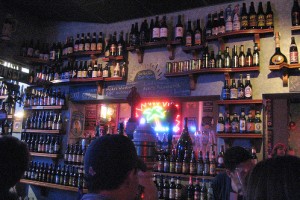A CBC news article posted yesterday (read it here) looking at Alberta’s booming craft beer industry offers the take that Canada might be reaching the limits to its market reach. It quotes a business professor, Dr. Larry Plummer, who hints that a slowdown in growth for the craft segment is occurring but the rate of new brewery openings is not. Their suggestion is that harder times are coming and that breweries will find it increasingly difficult to grow their market share.
The story then profiles a few Alberta breweries and bar owners as an example of the speed at which the industry is growing, with a sub-plot that ominous times are coming.
Will we soon reach peak craft beer?
The proponents, including Dr. Plummer, essentially argue that new brewery openings in a context of a stagnant market is not sustainable. Overall beer sales in Canada are slowly shrinking, even though craft is taking a larger portion of the existing market. Until now most growth in craft has come at the expense of the corporate brewers as consumers shift to smaller craft producers. Peak craft proponents argue this may be shifting and that new brewers will basically cannibalize customers from existing breweries – kind of a zero sum game.
On the surface it is a compelling argument, one certainly bolstered by evidence from bars and stores – there is only so much shelf space and so many taps to go around. The number of available sales locations are not growing at the same pace as the number of new breweries, meaning something has to give.
But, with respect to Dr. Plummer and his colleagues (note, I tried to access his case study, but refused to fork over $9 to get it, so have not read it), I disagree. We are not reaching peak craft. Not yet, anyway.
I believe the proponents make three key errors. First, is that they make too much of the overall beer industry trends. Yes beer is a stagnant market. But craft continues to be not much more than a niche player in that market. Small gains of the total market share equate to huge jumps in the presence of the industry. For example, say craft has 5% of a particular market with 50 breweries. If in a couple years it climbs to 7% of the market, that sounds small, but it is actually a 40% increase in the craft segment, and space for potentially 70 breweries (all other things being equal). Even if craft starts at 20% and jumps to 22% that is still a not insignificant 10% jump. In short, the numbers are still on craft’s side.
Second, the argument ignores regional differences. Dr. Plummer (fairly) writes from an Ontario perspective, with a more mature craft segment. Dynamics there are different than on the prairies. I have long argued that Alberta, Saskatchewan and Manitoba have lagged behind where they should have been in terms of craft market share. The quick explosion of new breweries in all three provinces can be seen as catch-up.
Third (which is kind of related to number one) is that these macro-analyses are built on a single model, the mid-sized production brewery than needs growing numbers to remain sustainable. The thing is that many of the new breweries opening up, not only on the prairies but even in Toronto or Vancouver, are adopting different models. Nano-brewing, community-supported beer, brewing as an adjunct to another business (e.g, malting, brewpub) all offer a different approach to selling beer. Many are opening in smaller centres as the only local brewery in the area. Common among them is that they are small scale and that most have a reduced growth drive, meaning sustainability means something different for them.
One could make a fair argument that real sustainability requires larger economies of scale. Maybe. But when starting that small, what do those economies of scale look like?
Don’t take my argument as predicting nothing but upward curves for craft beer. I do think some of the more mature, mid-sized and regional craft breweries are in for some challenges trying to keep themselves relevant in a more crowded market. And some of the new start-ups will fail, either due to lack of quality control, lack of capital or a well-intentioned but flawed business model.
But when those failures start to happen, resist the siren call of the peak craft-ers. It is not a sign of the limits to craft. It is a regular development in the natural evolution of an industry. Some fail, others will succeed. Such is how it is.
When Winnipeg, Regina or Calgary starts to look like Denver or Portland, then we can start having a serious conversation about peak craft. Until then, I am still placing my bets on the craft segment.



December 15, 2017 at 11:59 AM
Here here! You couldn’t have said it better, Jason. I like to look at analog cities like Denver, which has long been considered a sister city to Calgary due to similar geography, demographics and economics. There are hundreds of breweries in the Denver metro area, which has a population less than double that of the City of Calgary, alone. We will be lucky if Calgary and the surrounding areas (Okotoks, Cochrane, Chestermere, Airdrie, Strathmore, Bragg Creek) have over 30 operational breweries by the end of 2018. The Colorado market has had an extra 15-20 years to mature beyond what we have here in Alberta, so I see a lot of potential for Alberta breweries to end up numbering in the hundreds. Yes there may be growth spurts that exceed demand, but as long as there is market share to take from the big guys, there is potential for more breweries.
I’ve found that in mature markets like those in San Diego, San Francisco, Portland, Denver, Victoria, etc, it is actually difficult to find Budweiser or the other macros on draught, because there are so many high-quality local options that the bars are carrying. Personally, I’ll feel like we’ve hit saturation when the local neighbourhood pubs and chain restaurants have 20 beer taps and 16+ are local craft, which is typical elsewhere. We are lucky here if the neighbourhood pub carries any local craft at all, and if it does, it’s just a couple of taps and they are almost always blondes, wheat beers, or other stuff directly intended to replace the macro taps rather than any of the more modern, edgy styles. Our market is just a baby.
December 18, 2017 at 12:35 AM
Nice article! I had a similar take, with some slightly different conversation points to add to the discussion. Check my view out here: http://www.analogbrewing.ca/in-response-to-peak-beer-a-cbc-report/
December 18, 2017 at 10:29 AM
Once again Jason, a well written and well thought out opinion, or response to the CBC story. Anyone who watched the CBC segment should also read your article for a more complete and less pessimistic look at the issue.